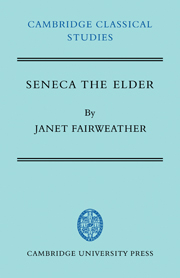Book contents
- Frontmatter
- Contents
- Preface
- Abbreviations
- PART I THE PLACE OF SENECA THE ELDER IN LITERARY HISTORY
- 1 Seneca the Elder: a man of his time
- 2 The declamatory anthology
- 3 The criticism
- PART II SENECA THE ELDER ON THE HISTORY OF ELOQUENCE
- PART III FIVE ASPECTS OF DECLAMATION: THE ELDER SENECA'S EVIDENCE
- PART IV THE PLACE OF EARLY IMPERIAL DECLAMATION IN LITERARY HISTORY: THE ELDER SENECA'S EVIDENCE
- Indexes
2 - The declamatory anthology
Published online by Cambridge University Press: 10 March 2010
- Frontmatter
- Contents
- Preface
- Abbreviations
- PART I THE PLACE OF SENECA THE ELDER IN LITERARY HISTORY
- 1 Seneca the Elder: a man of his time
- 2 The declamatory anthology
- 3 The criticism
- PART II SENECA THE ELDER ON THE HISTORY OF ELOQUENCE
- PART III FIVE ASPECTS OF DECLAMATION: THE ELDER SENECA'S EVIDENCE
- PART IV THE PLACE OF EARLY IMPERIAL DECLAMATION IN LITERARY HISTORY: THE ELDER SENECA'S EVIDENCE
- Indexes
Summary
The elder Seneca mentions several reasons why he came to write about declamations and declaimers. First, he will have us believe that the theme of his work was suggested by his sons:
Seneca Novato, Senecae, Melae filiis salutem.
Exigitis rem magis iucundam mihi quam facilem: iubetis enim quid de his declamatoribus sentiam, qui in aetatem meam inciderunt, indicare et si qua memoriae meae nondum elapsa sunt ab illis dicta colligere, ut, quamvis notitiae vestrae subducti sint, tamen non credatis tantum de illis sed et iudicetis.
(Contr. I pr. 1)This request from his sons is perhaps fictional or semi-fictional. To claim that one was writing at the request of some person was, like the epistolary greeting, a standard convention among ancient writers of prefaces to works whose utility needed to be emphasized. To make out that one's purpose in writing was to give information to some member of one's family had been a cliché in classical didactic writing ever since Hesiod had addressed the Works and days to his brother. To take two Roman instances, Cato in, for example, the dictum quoted by Seneca in Contr. I pr. 9: orator est, Marce fili, vir bonus dicendi peritus, and Cicero in his Partitiones oratoriae, had addressed rhetorical precepts to their sons, the latter in a baby-simple catechistic fashion which his rebellious offspring can hardly have appreciated. Admittedly Cicero's son was only thirteen when it was written.
- Type
- Chapter
- Information
- Seneca the Elder , pp. 27 - 49Publisher: Cambridge University PressPrint publication year: 1981
- 1
- Cited by



